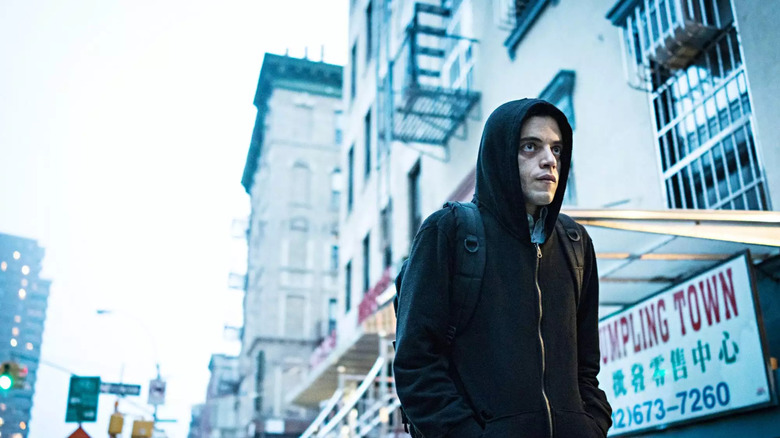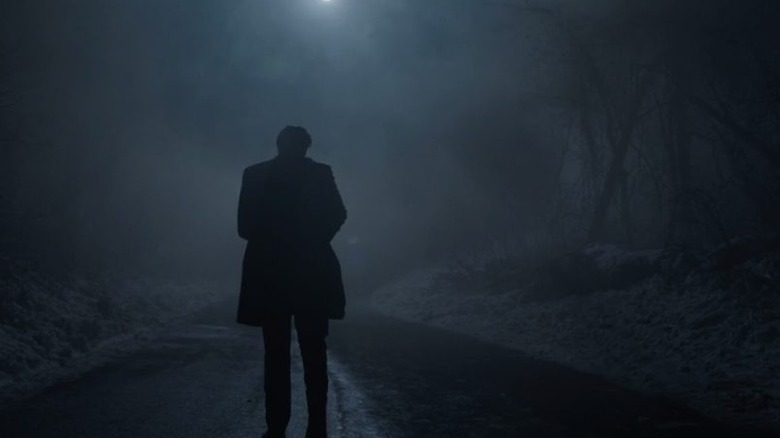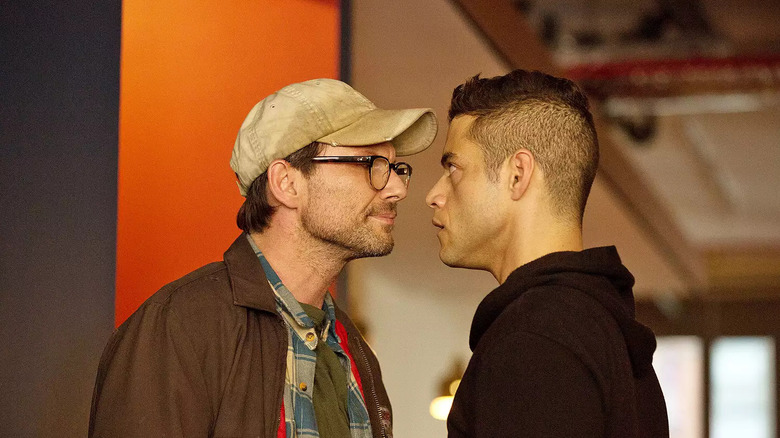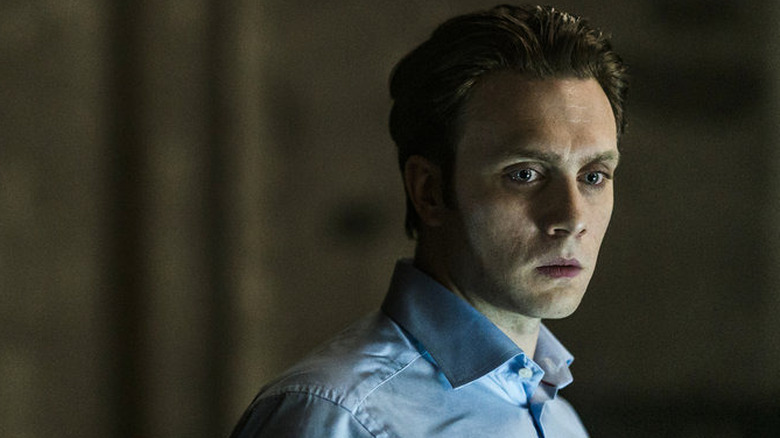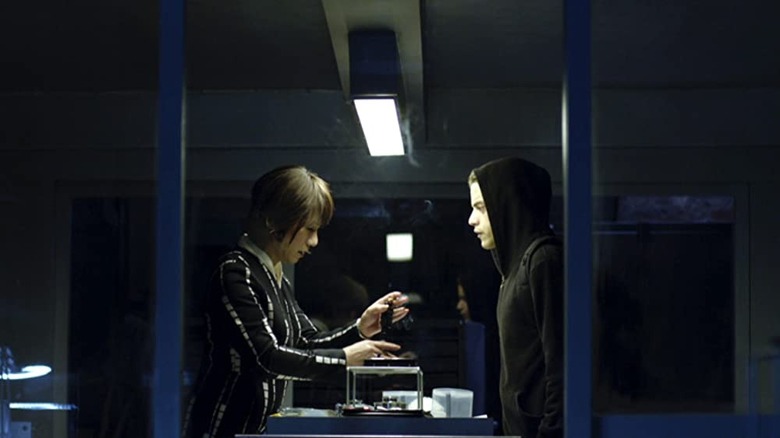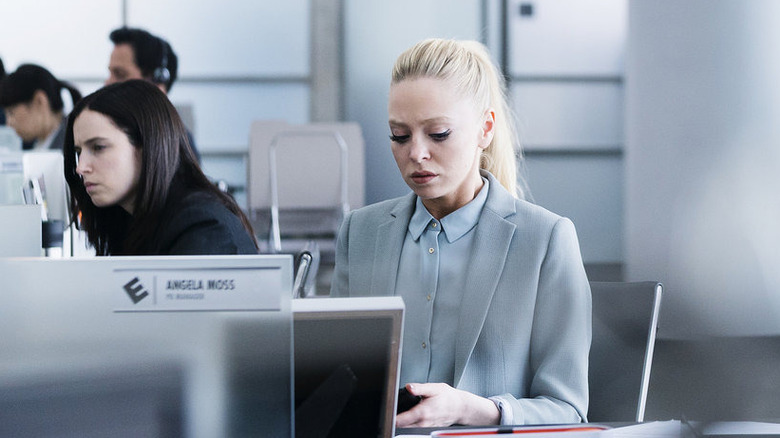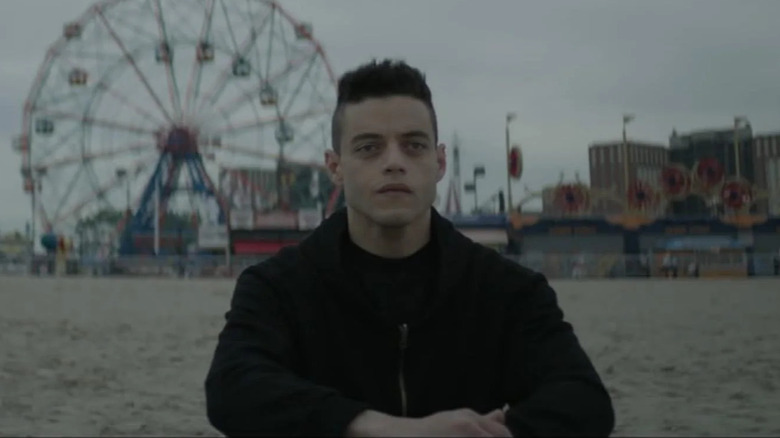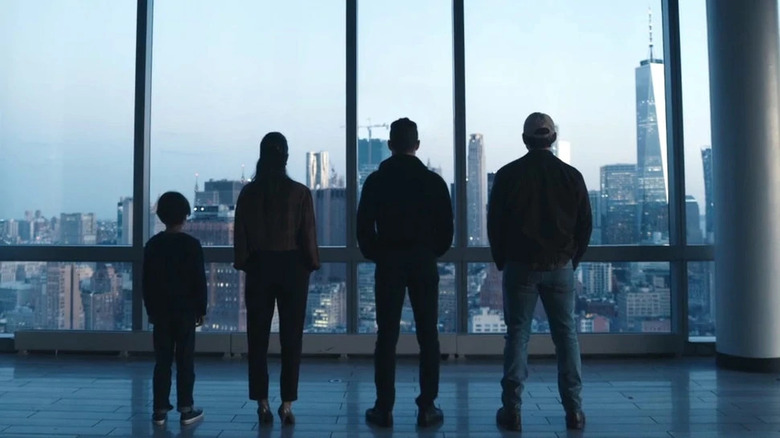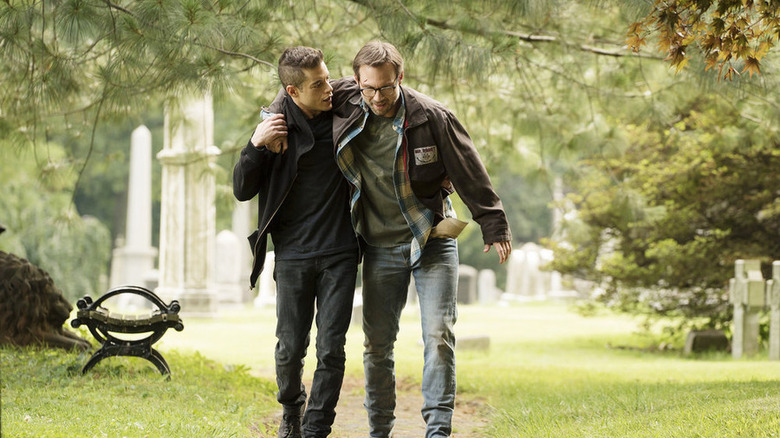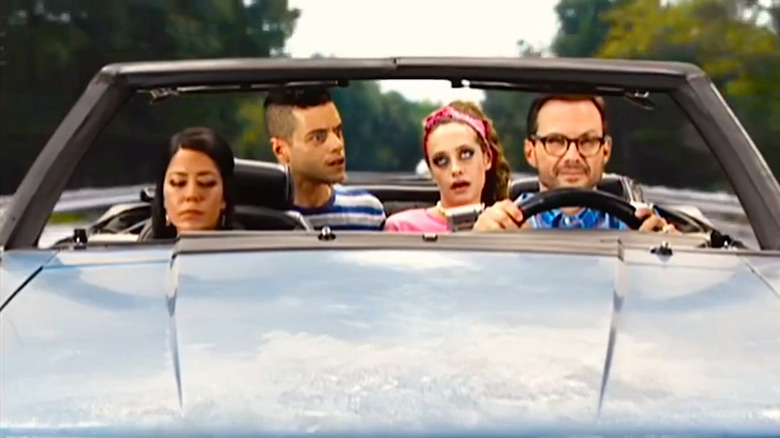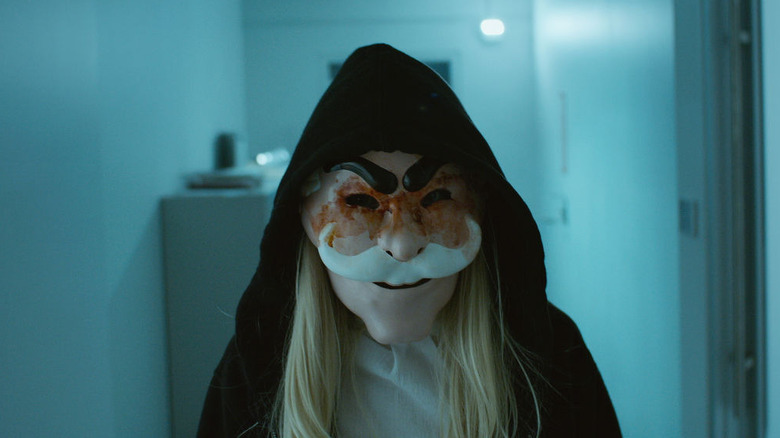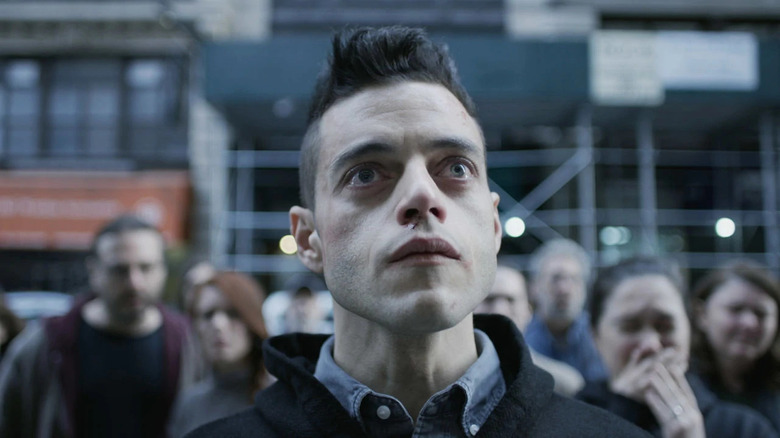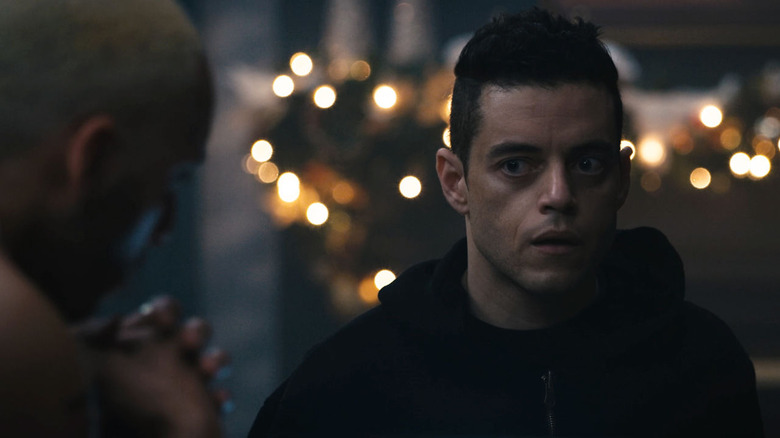The 12 Best Mr. Robot Episodes, Ranked
The USA Network hacking thriller "Mr. Robot" is one of the best and most underrated dramas of the past decade. Initially, "Mr. Robot" seemed like a risky project. While writer-director Sam Esmail established his merits as a creator with his highly underrated feature film directorial debut, "Comet," he had yet to prove himself as the showrunner of a complex narrative series. Rami Malek was rising star thanks to his role on HBO's "The Pacific," but the character of Elliot Alderson was very different from anything that he had done before.
All of these concerns evaporated after the first season reached its conclusion. With its stylistic direction, relevant social themes, electrifying soundtrack, and shocking twists, "Mr. Robot" was unlike anything else on television. It seems closer to an arthouse film than anything. The show contains allusions to such classics as "Blade Runner," "The Matrix," "Pi," and "Taxi Driver." "Mr. Robot" continued to get more ambitious throughout its run. The show reached its shocking ending in 2019, bringing the story of fsociety, the Dark Army, and Mr. Robot himself to a fitting conclusion. Here are the 12 best "Mr. Robot" episodes, ranked.
12. 404 Not Found (Season 4, Episode 4)
Tyrell Wellick (Martin Wallström) is one of the most interesting characters in the entire series. While Tyrell initially appears to be a scheming, self-absorbed aristocrat, it's quickly revealed that he is just a pawn in a larger scheme. Although Tyrell is rather unlikeable in the first season, he grows increasingly attached to Elliot and dutifully supports his cause. Tyrell's life in the series is tragic. His family is killed, and he's forced to go on the run.
"404 Not Found" brings Tyrell's journey to a stunning conclusion. Interestingly, the entirety of Season 4 takes place during the Christmas holiday season. There's a darkly foreboding nature in the way that Sam Esmail characterizes the festive time that is reminiscent of such dark Christmas classics as "Eyes Wide Shut" and "Batman Returns." In "404 Not Found," Tyrell, Elliot, and Mr. Robot (Christian Slater) flee from the Dark Army through a forest on Christmas Eve. During a skirmish with a particularly menacing assassin, Tyrell is killed. The episode ends with one of the most beautiful shots of the entire series. A dying Tyrell walks to the edge of the forest where he sees a white light. Perhaps this signifies that Tyrell has finally found peace in the afterlife.
Esmail frequently admits that he is a huge fan of the HBO series "The Sopranos." "404 Not Found" bears a striking resemblance to "Pine Barrens," one of the best episodes of the gangster show.
11. eps1.9_zer0-day.avi (Season 1, Episode 10)
It was always going to be challenging for the final episode of Season 1 to live up to expectations. The previous two episodes featured game-changing twists that completely redefined viewers' perspectives. However, "eps1.9_zer0-day.avi" is able to wrap up the emotional conclusion of Elliot's journey to accepting Mr. Robot as part of his identity.
In the episode's most powerful moment, Elliot stands in the middle of Times Square and sees reflections of his past on the billboards that surround him. As Dmitri Shostakovich's "Waltz No. 2" plays in the background, Elliot has a touching conversation with the apparition of his father. This shows that Elliot has grown confident in his plan. However, it signifies that he will have to face the consequences of the 5/9 attacks for the rest of the series. Fsociety is able to hide the evidence and escape. Their victory is short-lived, but it's rewarding at the moment.
"eps1.9_zer0-day.avi" also includes some exciting stingers that build anticipation for Season 2. E Corp CEO Phillip Price (Michael Cristofer) signifies to Whiterose (BD Wong) that he knows who is responsible for the attack. "Mr. Robot" always features interesting soundtrack choices, and the use of Alabama Shakes' "Sound and Color" during the final scene is wonderful. Although Elliot hears a knock on his apartment door, the identity of his visitor is unclear.
10. eps3.2_legacy.so (Season 3, Episode 3)
Season 3 takes time to catch viewers up to date on everything that had happened to the supporting characters during the events of the Season 2 finale. "eps3.2_legacy.so" explores the aftermath of Elliot's near-death experience from Tyrell's perspective. At the end of Season 2, Tyrell is a very different character than the one that viewers were familiar with in Season 1. He's blindly supportive of Elliot but doesn't understand how the relationship with Mr. Robot works. Tyrell grows to be a more empathetic character in this Season 3 episode.
After the night of the hack, Tyrell is pinned as the culprit by Dark Army agent Irving (Bobby Cannavale). Cannavale's idiosyncratic sense of humor makes all of his appearances entertaining. Irving has a casual demeanor, even when he is in the middle of a very violent or stressful situation. This gives the episode a fun clash of tones. Tyrell is desperate and terrified, but Irving doesn't seem all that concerned about anything.
Tyrell is taken by Dark Army agents to a cabin. Although he is briefly able to escape from captivity, he is recaptured by FBI Agent Ernesto Santiago (Omar Metwally), the boss of Dominique DiPierro (Grace Gummer). This reveals that the Dark Army has infiltrated American intelligence. Irving is eventually able to convince Tyrell to agree to the Dark Army's terms to protect his family. While Tyrell is often selfish, it's nice to see that there are people he cares about.
9. eps1.7_wh1ter0se.m4v (Season 1, Episode 8)
While the biggest shock of the season would be saved for the next episode, "eps1.7_wh1ter0se.m4v" begins the series of revelations about Elliot's identity. Before the incredible twist, the episode takes the time to introduce a character who has been pulling the strings all along. Elliot has a brief conversation with the Dark Army's secret leader, Whiterose. Whiterose is obsessed with controlling time and tells Elliot the Dark Army is backing out of their commitment to support fsociety. While the rest of Season 1 focuses mostly on fsociety's hack, this episode teases the larger role that the Dark Army plays in Season 2.
Elliot is able to shut down a kink in the plan, and Mr. Robot reveals that he's been working with Tyrell. Riding high on his success, Elliot embraces Darlene (Carly Chaikin) and tries to kiss her. Darlene is shocked and pushes him away. Elliot is surprised but then realizes the truth. Darlene is his sister. The previous episodes do a brilliant job at hinting at this. Darlene's ease around Elliot can either be interpreted as the confidence of a sibling or the suggestions of a lover.
This revelation is compounded by the final scene in which Elliot learns from some childhood photos that Mr. Robot is his father. "We need to talk," Mr. Robot says. The episode brilliantly cuts to credits before viewers have time to process what Mr. Robot is talking about.
8. eps2.5_h4ndshake.sme (Season 2, Episode 7)
The last few episodes of Season 1 completely recontextualize everything that we had seen so far. However, Sam Esmail was able to do the same thing in the middle of Season 2. During a conversation with his therapist, Krista Gordon (Gloria Reuben), Elliot is encouraged to recognize his environment. Elliot has been in prison since the end of Season 1. The knock on the door that he heard at the end of "eps1.9_zer0-day.avi" was the police coming to arrest him.
Esmail brilliantly intertwines footage of Elliot's daily routine and shows how everything has been processed through his illusion. Leon (Joey Bada$$) is his cellmate. Ray Hayworth (Craig Robinson) is the warden. Elliot isn't in his apartment. He's just recreating in his mind what his life looked like before to process everything. This speaks volumes about his character. Elliot needs a sense of normalcy to ground him. It also suggests to the viewer that Elliot cannot be trusted, even if he's narrating the story.
This episode helps to explain some of the discrepancies in the previous half of the season. Viewers may have been confused about why Elliot's activities are left separate from Darlene and the other members of fsociety. This allows the audience to breathe and realize that Esmail was already several steps ahead of them.
7. eps3.7_dont-delete-me.ko (Season 3, Episode 8)
"Mr. Robot" was groundbreaking in the way that it tackled issues such as depression, anxiety, and hopelessness. Many viewers may have been attracted to the series because they felt represented by Elliot. Depictions of mental health issues in popular media can often be inappropriate or unproductive. Trying to make someone who is dealing with serious issues into a "quirky" character is frankly insulting. The Season 3 episode "eps3.7_dont-delete-me.ko" is perhaps the show's frankest deconstruction of the nature of healing.
Elliot is heartbroken about his failure to stop the bombings. Although he finally felt that he had made an arrangement with Mr. Robot to protect innocent people, Elliot realizes that all of their efforts were futile. Several members of Darlene's team, including Trenton (Sunita Mani), are killed and blamed by Dark Army for the attacks. Elliot wanders to a beach. It's clear that he is suicidal. However, he runs into Trenton's younger brother, Mohammed (Elisha Henig). Mohammed won't leave Elliot alone, and they are forced to spend time together, bonding.
It's possible that the episode takes place in Elliot's head and that Mohammed is merely an illusion that he has created to save himself from suicide. Either way, Elliot is able to accept his failure and move on. He even takes the time to bond with his longtime friend, Angela Moss (Portia Doubleday).
If you or anyone you know is having suicidal thoughts, please call the National Suicide Prevention Lifeline by dialing 988 or by calling 1-800-273-TALK (8255).
6. Hello, Elliot (Season 4, Episode 13)
A significant portion of every great show's legacy is the reaction to the series finale. Some shows such as "Mad Men," "Breaking Bad," "The Leftovers," and "The Wire" have such terrific final episodes that they reenergized their fanbases and made the shows more popular than ever before. However, popular shows like "Game of Thrones," "Dexter," and "House of Cards" ended on such disappointing notes that fans have become more hesitant about recommending them at all. Thankfully, "Mr. Robot" delivered a terrific final episode that brought Elliot's journey full circle without tying things up too nicely.
The series concludes with two episodes titled "whoami" and "Hello, Elliot." The title of the latter is a reference to the very first episode of the series, "eps1.0_hellofriend.mov." Sam Esmail made an incredibly brave decision with his final twist: The "Elliot" that we've been following is not Elliot but another illusion that he has created to process everything that has happened to him. Elliot's mind spiraled out of control after he fell from the window as a child. He finally wakes up in the hospital, with Darlene there to greet him. Krista informs Elliot that he is "The Mastermind" that he's been searching for.
This is an incredibly bold twist, but it reinforces the most important relationship in the series: Elliot and Darlene. Choosing to conclude the show with a bonding moment between siblings is powerful.
5. eps1.8_m1rr0r1ng.qt (Season 1, Episode 9)
The biggest shocker of the first season occurs when "Mr. Robot" pulls a "Fight Club." After learning that Mr. Robot is his father, Elliot travels to his childhood home. Mr. Robot desperately tries to tell Elliot that he will always be there for him. However, they are confronted by Angela and Darlene, who are clearly concerned. Darlene asks Elliot who he thinks he has been talking to. Elliot struggles to accept the truth. After looking at his father's grave, he realizes that Mr. Robot is just a different identity that he has created for himself. "I am Mr. Robot," he reluctantly says.
While some eagle-eyed viewers may have predicted this twist, it took the majority of the audience by surprise. It's clear that Elliot is not a reliable narrator, but it isn't evident how much of the series is part of his illusion. This revelation doesn't just exist to pull the rug out from underneath the viewers. Elliot is taken off guard in the same way that the audience is. This helps make Elliot more relatable. Rami Malek delivers one of his best performances in the series. He is traumatized as he tries to process what he has learned. This becomes even more emotional after what we learn about his past in Season 4.
Elliot's last conversation with Tyrell is slightly eerie. His philosophical tirade about wanting to save the world suggests that his mind has become more fragile.
4. eps2.4_m4ster-s1ave.aes (Season 2, Episode 6)
"Mr. Robot" is unique for its direction. Sam Esmail directed a majority of the episodes in Season 1 and directed all of the last three seasons. While this could have made the tone stale after a while, Esmail kept viewers on their toes by taking huge stylistic risks. The Season 2 episode "eps2.4_m4ster-s1ave.aes" is certainly among the series' boldest.
The episode opens in a bizarre, 1990s-style sitcom setting where Elliot, Darlene, and their parents are taking a family vacation. There is a laugh track, which plays any time something particularly disturbing happens. This adds a dark sense of humor to the episode that contrasts the bright colors and landscapes. It's amusing to see all the characters that we recognize pop up in this version of reality. Angela is a cashier at a store that the Alderson family robs, Tyrell is trapped in Mr. Robot's car trunk, and Gideon Goddard (Michel Gill) even reads a newspaper headline signifying his demise.
There are some particularly amusing references that 1990s kids may enjoy. "Alf" even shows up! While this could have been nothing but a fun detour, the episode justifies its change of pace by explaining that Mr. Robot created this reality to help Elliot heal.
3. eps3.4_runtime-error.r00 (Season 3, Episode 4)
The idea of presenting a narrative as a single continuous tracking shot isn't an original concept. Alfred Hitchcock perfected the technique with "Rope," Alejandro Gonzales Innaritu used it in "Birdman (or the Unexpected Virtue of Ignorance)," and Sam Mendes utilized it for his immersive war epic, "1917." However, it's a stylistic choice that audiences may not have expected to see on television. "eps3.4_runtime-error.r00" is presented as one continuous shot without any obvious cuts or edits. It was a particularly rewarding episode for anyone that had watched the first airing, as the episode was presented without any commercial breaks that would have disrupted the experience.
Using this technique in and of itself would have been impressive, but "eps3.4_runtime-error.r00" features one of the most intense action sequences in the series. Elliot attempts to return to the office of his old employer, E Corp. The building is surrounded by protestors who are trying to barge their way into the building. As Elliot and Darlene attempt to make their way into the facilities, chaos breaks loose. Elliot must try to shut down the computer system before the results of the UN vote come in.
The episode does a great job of navigating between the characters' perspectives. At one point, Angela takes center stage. Angela's horrified reaction to the events that follow sets up a very interesting change in her character arc.
2. eps3.5_kill-process.inc (Season 3, Episode 5)
Following the incredible filmmaking in "eps3.4_runtime-error.r00," the subsequent episode got even more intense. After Elliot unites with Angela, he realizes that he needs to break into the Stage 2 target building to prevent the system from detonating. Elliot's humanity is one of his best attributes. In this episode, he puts himself through immense strain as he tries to save innocent people. This helps to underscore Elliot's sense of guilt. He feels that the aftermath of the 5/9 attacks is all his fault.
Elliot races against time to shut the system off. It's here that we see a major development in his relationship with Mr. Robot. After Mr. Robot closes off Elliot's mind and disrupts his mission, they end up reluctantly working together. Elliot gains Mr. Robot's trust and shuts the system off before the explosion. It's a nice moment of bonding, but it doesn't last very long. After he exits the Stage 2 building, Elliot watches news footage of dozens of buildings being destroyed. He realizes that there was more than one building targeted. This establishes a darker tone for the rest of the season as the characters cope with the tragedy.
1. 407 Proxy Authentication Required (Season 4, Episode 7)
"407 Proxy Authentication Required" is the most important episode of "Mr. Robot." While previous twists in the series redefined our perspective, "407 Proxy Authentication Required" explains why Elliot sees the world the way that he does. Sam Esmail directs the episode as an elegant play composed of five acts. Elliot is captured by Fernando Vera (Elliot Villar), who forces him into an emergency therapy session with Krista.
Krista and Vera slowly deconstruct Elliot's psychology as he recounts the events of his childhood. Elliot always thought that his father pushed him from a window when he was young. It slowly dawns on him that he actually jumped to escape. Elliot's father was sexually abusing him.
If this was presented as just another shocking twist, it could have been disrespectful. However, giving Elliot the time to reach this conclusion is simply heartbreaking. Rami Malek delivers his single greatest performance in the entire series.
If you or someone you know may be the victim of child abuse, please contact the Childhelp National Child Abuse Hotline at 1-800-4-A-Child (1-800-422-4453) or contact their live chat services.
